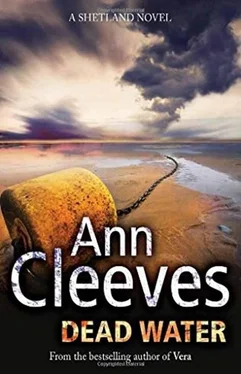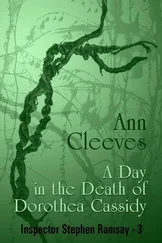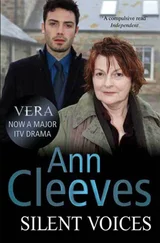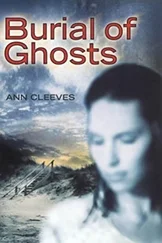The next morning she was in the police station before he was. She’d tied back her hair, but it still looked untidy and she was wearing the same shapeless jumper. She looked up from the desk they’d found for her in the small office that Perez had once used. A mug full of something that smelled herbal and looked like piss stood on her desk.
‘I’ve tracked down Markham’s mobile-phone provider,’ she said. ‘I got his number from his parents. There seems to be some problem – maybe he recently got a new number – but they’re trying to find it for me. It’s too early for news from Aberdeen on the postmortem.’
‘I’m going to head out to Vatnagarth,’ Sandy said. ‘I checked the council website and the museum’s open this morning.’ He always preferred to be out of the office. Here, he had the sense that people were looking over his shoulder, judging his work.
‘Sure,’ Willow said. ‘Whatever you think.’ Her attention had already been caught again by the screen in front of her.
In the copse of sycamores there seemed to be birds everywhere and the sun was bright as he approached the museum. A people-carrier was parked outside, but Markham’s car had been removed. It would be taken south to Aberdeen on the ferry. The crime-scene tape had disappeared too and there was no sign that the police had ever been interested in the place.
There was smoke coming out of the chimney, so everything smelled of peat. The door was open and he walked into the tiny space that separated the but-end of the house from the ben. To his left another door led into a living room. The window was so small and the walls were so thick that there was very little light. He struggled to make out if anyone was there. Then he saw a large woman wearing a skirt that looked like sackcloth and a knitted jacket. The sort of clothes he’d seen in photos in his grandmother’s house, so he wasn’t sure for a moment if she was real or a kind of manikin. She was sitting on a Shetland chair close to the range. He felt that he was stepping back in time, into one of his grandmother’s photos. Then the woman moved; she was feeding carded fleece into a spinning wheel.
‘Welcome,’ the woman said. ‘Come in.’ He had the sense that he’d seen her before, very recently, but he couldn’t quite remember where. ‘Look around at whatever you like and give me a shout if you have any questions. There’s a booklet on the table.’
‘I’m not a tourist.’ He was offended. ‘I’m investigating Jerry Markham’s murder. His car was found parked outside the museum yesterday.’
She paused in her spinning and set down the fleece. ‘I heard. What a dreadful thing!’
‘And you are?’
‘Jennifer Belshaw. Jen.’
Then he remembered where he’d seen her. She’d been one of the women in the hennie bus on Friday night. They’d been talking about her in the bar in Voe when he and Willow had stopped there for lunch the day before. The name rang another bell. ‘Any relation of Andy Belshaw?’
‘Aye,’ she said. ‘He’s my husband. Why?’
Jerry Markham visited him at Sullom Voe just before he was killed.’
‘Well, I’ve never met Mr Markham,’ she said frostily. ‘As far as I’m aware. I certainly had nothing to do with his death.’
‘But his car was found outside the place where you work.’
She laughed. ‘I don’t work here. I’m a volunteer. I do this for fun. And I’m only in this morning because my friend was delayed. I’ll be away to cook Sunday lunch for my family once she turns up.’
‘Would anyone have been here on Friday evening?’ He thought it was a long shot. He could think of more exciting places to be on a Friday night than a damp croft-house miles from anywhere.
‘Yes,’ she said. ‘There were people here all day. We hire out the barn to community groups. In the morning a readers’ group, in the late afternoon a tea dance for the over-60s’ club.’ She looked up at him. ‘I play the fiddle, and I was here for that. Then in the evening a meeting to discuss the new tidal-energy scheme at Hvidahus.’
‘You weren’t here for the meeting?’
‘No,’ she said. ‘Not my kind of thing. Besides, it was my friend’s hennie. I couldn’t miss that.’
‘What about your husband?’
She laughed again. ‘No way! He works in Sullom and sees renewable energy as a sort of witchcraft. He was in Brae at the sports centre. He runs a kids’ football team.’ She’d started spinning again and seemed completely relaxed.
‘Can you give me contact details for the tidal-energy group?’
‘Sure,’ she said. ‘Talk to Joe Sinclair and he’ll tell you who was there.’ She jotted down a number on a scrap of paper.
Returning to his car, he felt he’d conducted the interview poorly and that when she’d started laughing, she’d been laughing at him.
Everyone in Shetland knew Joe Sinclair. He was born and bred a Shetlander, but had gone to sea and worked his way up to being master of a giant container ship, sailing out of Singapore. Then he’d come home and for the last ten years he’d been harbour master at Sullom Voe. Sinclair had fingers in many pies and friends in high places. Sandy phoned him at home. One of his daughters answered, and when he came to the phone Sinclair sounded rested and relaxed. A man in late middle age enjoying a weekend with his family.
‘I wasn’t at Vatnagarth,’ he said. ‘I’m involved with Power of Water, on the steering group, but that would have been the opposition meeting last night and they’d certainly not have invited me along.’ He gave a little chuckle.
‘The opposition?’ Sandy was already out of his depth.
‘A small band of busybodies. They think we’ll ruin the environment around Hvidahus by having a substation there to collect the power. Most of them are incomers, though Francis Watt stirs them up from time to time with his talk of corruption and conspiracies. You’ll have seen his column in the Shetland Times. ’ In the background Sandy could hear Sinclair’s teenage daughters laughing.
‘Who would have been at the meeting on Friday?’
‘A guy called Mark Walsh would have set it up. He worked as an accountant for some multinational in the south before taking early retirement and heading here for the good life. They bought the big house in Hvidahus and he sees the tidal-energy scheme as a threat to his investment. The wife’s pleasant enough, but there’s nothing Walsh likes better than causing mischief. I’m not sure that the good life suits him after all.’
Mark and Sue Walsh lived in a whitewashed house at the end of a track right by the pier at Hvidahus. It seemed to Sandy to be very grand. There were pictures on the walls and books everywhere and the garden was landscaped with flowers. The couple welcomed him into the kitchen, as if they didn’t get many visitors and were pleased to see him. The woman chatted while the husband made coffee. They’d visited Shetland on holiday since they were students and had decided to move north when her husband took early retirement. They’d fallen in love with the house and its views as soon as they’d seen it. It was too big for them, but they’d decided it would make a classy B&B. This would be their first season as a business and already they were fully booked for July and August. She smiled. ‘My husband doesn’t really do retirement.’
Sandy drank the coffee, which was a bit strong for his taste.
‘I understand that you were at Vatnagarth on Friday evening. A meeting?’
‘The Save Hvidahus Action Group,’ Mark Walsh said. ‘We moved to Shetland because it’s so unspoilt. The last wilderness in the UK. Of course we believe in green energy, but not at the expense of the natural environment. Look at the dreadful new wind farm! It’s time to call a halt to these major developments.’
Читать дальше












